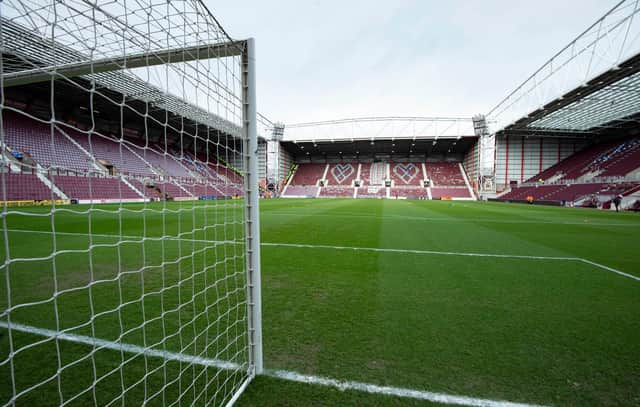Behind the scenes at Hearts as staff feel harsh effects of wage cuts due to coronavirus impact


Hearts' request to cut staff wages by 50 per cent exemplifies the impact the coronavirus is already having in football. As often happens when a club hits financial problems, those who will never kick a ball for their employers will suffer more than most.
Manager Daniel Stendel, his players and coaches were asked to drop salaries by half as owner Ann Budge takes drastic measures with matches suspended and no income. She expects Hearts to have lost £1million by mid-April. All other full-time employees at the club's Riccarton training ground and Tynecastle Park were asked to do likewise.
Advertisement
Hide AdAdvertisement
Hide AdIt is the non-football staff, the so-called everyday people on ordinary wages, who will find this most challenging. Senior players dropping from, for example, £150,000 a year to £75,000 a year is different to a young father going from £28,000 a year to the Real Living Wage of £18,135 in the blink of an eye.
Mortgage payments and babies
There are certain Hearts personnel who endured a 12-month administration process in 2013/14 and are still there. They survived that crisis and must now face another. Neither was of their making. Some Tynecastle office workers with young children have already contacted banks about deferring mortgage payments as they prepare for their money halving. The alternative offered by Budge is termination of contract with no severance package.
More than one employee recently bought a new home with mortgage agreed and is now worrying about how they will pay for it. Others already have young kids to provide for with another baby on the way. One member of the workforce only gave birth recently. Some have partners also forced to take significant wage cuts in their jobs, halving the household income almost overnight.
These are the real-life realities that football fans often don't get to see. Nobody could have predicted the coronavirus devastation, which will affect every industry. Football is just one and Hearts are merely a solitary example. There will be many more to come as clubs begin appealing to fans for financial donations.
No deadline given
Advertisement
Hide AdAdvertisement
Hide AdNo deadline is set for Hearts staff to decide whether they want to accept the wage reduction. They were told to go away, take time to think and make any necessary phonecalls to reshuffle personal finances. The majority of non-football workers at the club are likely to accept reluctantly – for the simple reason it is a better option than unemployment right now.
Certain players could view the situation differently. Youngsters with burgeoning careers or established internationalists with a solid reputation in the game may find it to their advantage to become a free agent ahead of the summer transfer window. Not all will see things in a clear-cut fashion. There is massive disparity between salaries in the first-team squad, weekly wages ranging from the £800 mark to around £6000. Again, the lowest-paid will find this crunch more difficult.
The plan is for all Hearts staff to work on 50 per cent salaries until money begins trickling back into club accounts. That applies to everyone on the payroll, including former manager Craig Levein and his assistant Austin MacPhee. So, whenever matches resume, it might take potentially three or four weeks for cashflow to improve and wages to revert to normal.
Hearts know they risk losing players and coaches with this move, and there is no question their 35-man first-team squad needs pruning. Especially if they end up relegated to the Championship.
Questions over club finances
Advertisement
Hide AdAdvertisement
Hide AdThere are questions to be asked about why club finances are not more flexible at the moment. With almost £10m donated from fans via Foundation of Hearts pledges since 2013, and nearly £9m from anonymous benefactors in the last three years, extra income has not been a problem. That's on top of season ticket sales, match-by-match gate receipts, sponsorship, prize money and TV revenue. Hearts’ annual accounts show they would be running at a considerable loss each year without those fan and benefactor contributions.
The income has been swallowed up by a new main stand project stretching to £22m, repaying Budge’s initial £2.5m investment, plus too many wasteful player signings under Levein in particular. Storing some cash reserves for a rainy day would have been wise. Budge must accept funds should have been used better, particularly with regard to extensive budgets given to Levein and previous head coach Ian Cathro.
She signed off lengthy player contracts on their recommendations, then saw the likes of David Vanecek and Malaury Martin discarded quickly. Others including Rafael Grzelak and Danny Amankwaa were also inadequate. Hearts have recruited almost 80 players since Budge initially appointed Levein director of football in 2014. Their latest accounts detailed total staff costs as £8.2m – an increase of £1m from the previous year.
Now they find themselves bottom of the Premiership despite all that expenditure, while a virus-enforced global financial crisis begins to bite. The night former head coach Robbie Neilson shuffled out of Tynecastle after a 2-0 win against Rangers in November 2016 remains pivotal. On the field, the team has not been the same since. Off it, Hearts are now fighting to survive by preserving as much money as possible, and their employees are footing the bill.
Comment Guidelines
National World encourages reader discussion on our stories. User feedback, insights and back-and-forth exchanges add a rich layer of context to reporting. Please review our Community Guidelines before commenting.